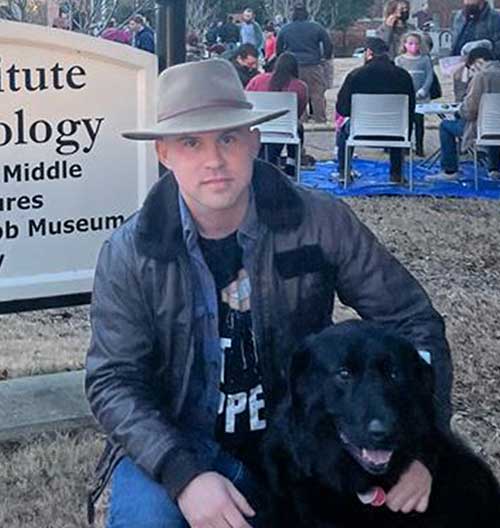Eric Anderson (Class of 2018)

Eric Anderson is an entrepreneur and bioarchaeologist who has worked across the United States and overseas. After serving in the United States Marine Corps in 2014, he attended the University of South Alabama. He found his path after taking the course “Answers from the Grave: The Archaeology of Death in Prehistoric Britain” during a study abroad program in the UK. This course sparked curiosity in a new discipline, and upon returning from this study abroad program, he changed his major to Anthropology. At South Alabama, he discovered his passion for bioarchaeology and attended the Field School in Mortuary Archaeology in Giecz, Poland. In 2018, he earned a B.A. in Anthropology and began working for DESCO CRM firm.
Wanting to further his academic career, Eric obtained his Master's degree in Applied Anthropology at Mississippi State University. At MSU, he joined the Field School in Mortuary Archaeology as an assistant osteologist in the Giecz team. There, he taught osteology and excavation techniques for human remains to students each summer.
As part of his master's thesis, he invented the Portable Osteometric Device (POD) and tested its reliability and validity as a replacement for the current portable osteometric board design. This novel device inspired Eric to found Advanced Research Collection Technologies LLC (ARC Tech) in 2021, marking the beginning of his entrepreneurial career. At ARC Tech, he has published research articles at conferences, received multiple grants, and is working on collaborative research projects to develop new ideas. One of his goals is to bring an entrepreneurial perspective to the field of anthropology, enhancing and expanding its scope. After graduating from MSU, he has worked as a bioarchaeologist for the Arizona State Museum, an osteologist in Hawaii for Cultural Surveys Hawaii, and it is currently a Research Affiliate at the Cobb Institute of Archaeology.
In his own words: “The University of South Alabama had a tremendous influence on my life and career in the field of bioarchaeology. The experience and mentorship I received at USA were the foundation that allowed me to work in the U.S. and abroad in multiple locations, obtain my master's degree in Anthropology at MSU, and meet some fantastic people. These experiences have taught me the importance of hard work, dedication, innovation, teamwork, compassion, and reverence required to be a bioarchaeologist.”
